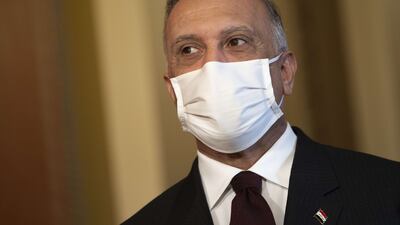Iraqi Prime Minister Mustafa Al Kadhimi headed to Kuwait on Sunday, seeking to repair relations damaged by Saddam Hussein’s 1990 invasion of the oil-rich emirate.
Mr Al Kadhimi's visit is "part of the government efforts to boost co-operation and bilateral relations with different countries, including the brotherly Kuwait state”, a statement issued by the prime minister's office said.
The countries will discuss co-operation in fields such as politics, economy, energy and investment.
The invasion of Kuwait shocked the region and the world, leading many countries to sever ties with Saddam's regime, while the UN imposed harsh economic sanctions for more than a decade.
With Iranian influence growing in Iraq after the 2003 US-led invasion that toppled Saddam's Sunni regime and brought the majority Shiites to power, the mainly Sunni Arab countries were hesitant to restore relations.
To counter the Iranian influence, Washington started in 2007 to press for Arab countries to play a bigger political role in Iraq.
Since then, Iraq has had a steady stream of visitors from Arab countries and co-operation has increased in a number of fields.
In late 2008, Kuwait sent its ambassador to Baghdad as Iraq’s mainly Sunni neighbours sought to restore ties.
Since the liberation of Kuwait in 1991, Iraq has been paying billions of dollars as compensation for losses and damage from the 1990 invasion and the seven-month occupation.
As of last month, Iraq paid $51.3 billion, leaving approximately $1.1bn outstanding, the UN Compensation Commission said.
Payouts, derived from Iraqi oil sales, are made quarterly as funds become available and the share for the compensation fund is set at 3 per cent of oil revenue.
Despite improving relations in recent years between the neighbouring countries, no progress has been made on pending issues, such as borders.
In recent months, Iraq has boosted its presence in the region, playing the role of mediator between Arab countries and Iran.
Meetings were hosted in Baghdad between Iran and Saudi Arabia in an attempt to restore relations that were severed in 2016.
Baghdad says rebuilding ties between the two regional heavyweights will help reduce tension in Iraq and beyond.
Baghdad also plans to hold a regional summit this month, for which letters of invitation have been sent to leaders in Iran, Saudi Arabia, Kuwait, Turkey, Jordan, Egypt, the UAE and Qatar.


